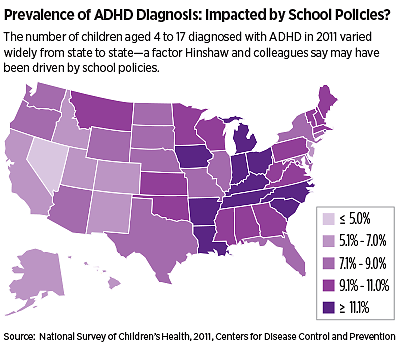Education Policies May Influence ADHD Diagnoses
Abstract
Despite an increase in the number of ADHD diagnoses nationwide, diagnoses held steady in states with laws prohibiting schools from recommending that children take psychotropic medications.
According to the Centers for Disease Control and Prevention (CDC), the number of children diagnosed with attention-deficit/hyperactivity disorder (ADHD) across the United States rose 42 percent from 2003 to 2011, though state-level changes varied dramatically. While multiple factors likely contributed to these differences, a study published in the June 1 Psychiatric Services in Advance suggests growing academic pressure on students and their teachers brought on by changes in educational policies may be partly to blame.

In recent decades, strategies to ensure the quality of public education for all children in the United States, particularly those in low-income families, have focused on holding schools accountable for the performance of their students. Between 1992 and 2000, 30 states enacted consequential accountability reforms—tying teacher salaries, school district budgets, and more to achievement test scores, among other things. The passage of the No Child Left Behind Act of 2001 (NCLB) mandated consequential accountability in the remaining 20 states and the District of Columbia at the start of the 2002-2003 school year.
ADHD’s core symptoms—inattention, hyperactivity, and impulsivity—can create major challenges in the classroom. The same year that NCLB went into effect, the CDC conducted its first National Survey of Children’s Health (NSCH), a telephone survey that, among other questions, asked parents whether a health care provider had ever told them that their child had ADHD. The survey was repeated in 2007 and again in 2011.
The NSCH data over multiple timepoints offered what Stephen Hinshaw, Ph.D., a professor of psychology at the University of California, Berkeley, called “a natural experiment,” whereby he and colleagues could explore whether a link between consequential accountability and ADHD diagnoses exists.
Drawing from NSCH data from 2003, 2007, and 2011 (representing around 35,000 children aged 6 to 13 attending public school at each point), Hinshaw and colleagues compared how ADHD diagnostic prevalence changed between two health survey waves in states that had consequential accountability initiated by NCLB with states that had consequential accountability before NCLB.
They found that from 2003 to 2007, public school children from low-income households residing in states first exposed to consequential accountability through NCLB showed an increase in adjusted ADHD diagnostic prevalence of 56 percent compared with a prevalence increase of 19 percent in demographically similar children living in states that had consequential accountability before NCLB. (Increases in ADHD diagnoses in middle- and high-income children from states first exposed to consequential accountability through NCLB were consistent with the overall national averages.)
This association did not continue from 2007 to 2011—a factor Hinshaw suggests may be due to a greater short-term initial response to NCLB and the introduction of a different set of education incentives in 2009.
“No one passed No Child Left Behind to boost ADHD diagnoses; it was to boost test scores,” Hinshaw said. “Our study demonstrates that consequential accountability may have led to an overdiagnostic surge in ADHD.”
In contrast, when the researchers analyzed ADHD diagnoses from 2003 to 2011 in states with “psychotropic medication laws”—those that prohibit public schools from recommending or requiring a child to take a psychotropic medication—they found ADHD diagnoses remained flat, despite an overall national uptick in ADHD diagnoses.
“Whether a good thing or not, the findings show policies are influential in whether a child gets a diagnosis,” Hinshaw said. Such influence may be caused by physicians’ lack of familiarity with ADHD diagnostic guidelines set by the American Academy of Pediatrics and American Academy of Child and Adolescent Psychiatry and growing pressure on pediatricians and other health professionals by teachers and schools, he added.
“If education reforms are encouraging teachers to pay closer attention to students who might have ADHD, I think that’s terrific,” R. Scott Benson, M.D., an APA trustee and a child psychiatrist in private practice in Pensacola, Fla., who was not involved with the study, told Psychiatric News. “The guidelines for evaluating and treating ADHD are clear. If you follow these guidelines, no one is going to get misdiagnosed or overtreated.”
What’s more concerning, Benson said, are the efforts by some states to keep teachers from having conversations with parents about ADHD. “We don’t talk enough about mental illness. If you don’t let people talk, you will find fewer cases,” he added, noting that in addition to struggling in school, children whose ADHD is left untreated are at increased risk of underemployment and substance abuse later in life.
The study by Hinshaw and colleagues was supported by grants by the Robert Wood Johnson Foundation and the University of California, Berkeley. ■
An abstract of “State Variation in Increased ADHD Prevalence: Links to NCLB School Accountability and State Medication Laws” can be accessed here.



